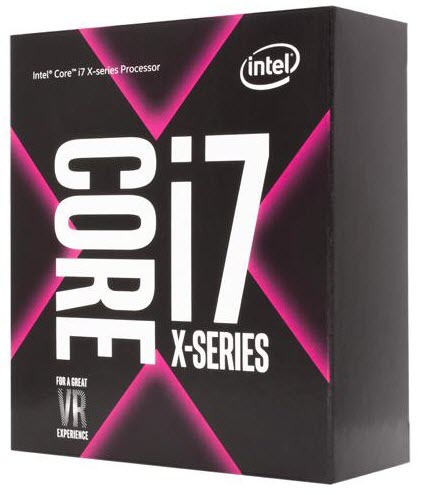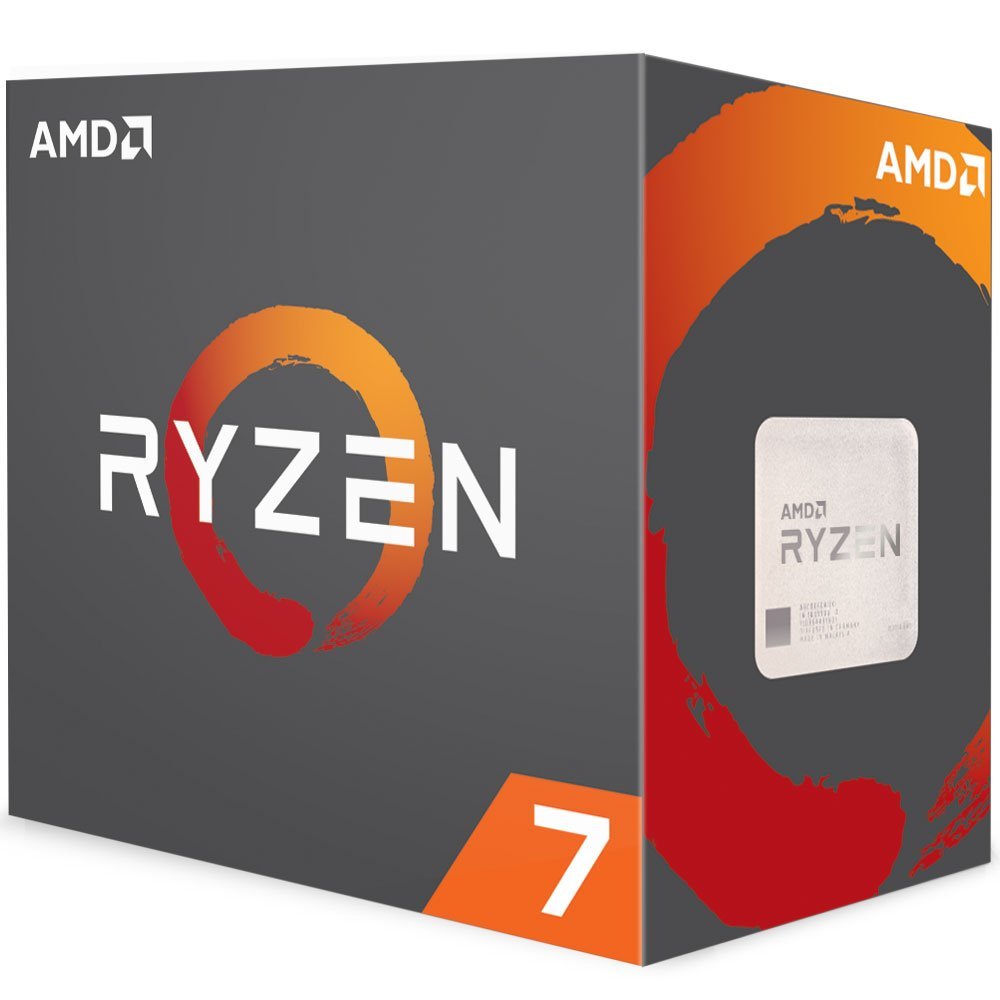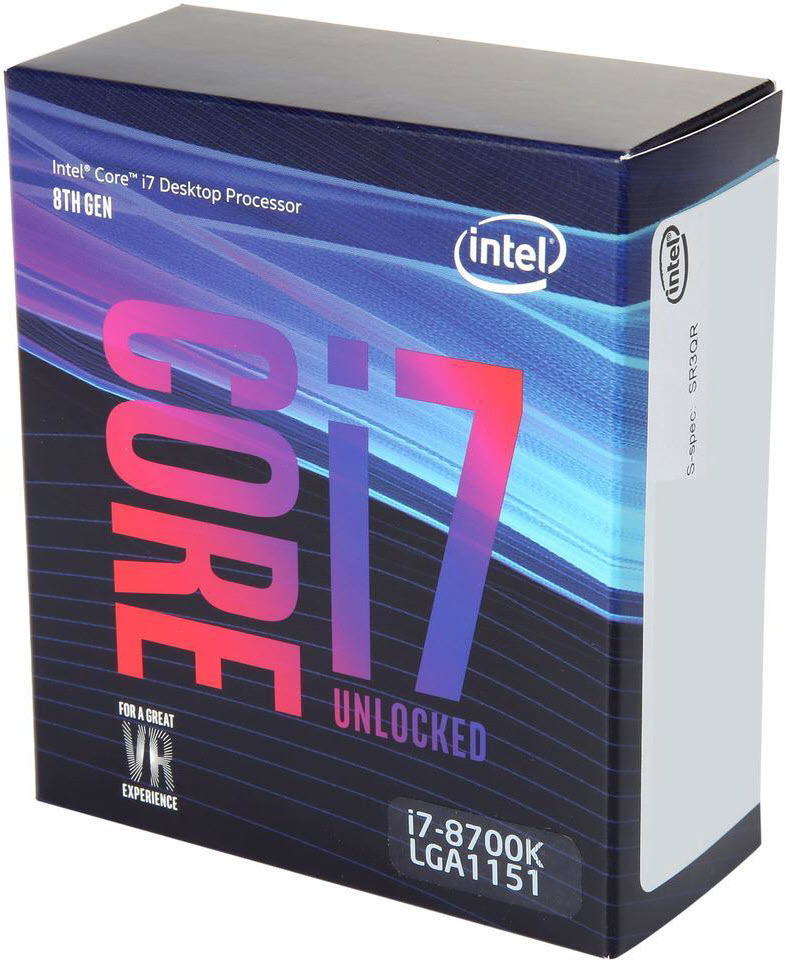AMD Ryzen Threadripper 1900X CPU Review
Why you can trust Tom's Hardware
VRMark, 3DMark & AotS: Escalation
Test Notes
The Threadripper processors feature a unique architecture that underperforms AMD's other Ryzen chips in some games. To offset the 1900X's compromises, AMD facilitates its novel Game Mode, which switches the processor into NUMA mode and disables one die. We covered the feature in-depth in our AMD Ryzen Threadripper 1950X Game Mode, Benchmarked article.
AMD aims Threadripper at content creators, heavy multitaskers, and gamers who stream simultaneously. It also says the processors are ideal for gaming at high resolutions. Threadripper CPUs and the GPUs they're likely paired with aren't intended for playing around at low resolutions, particularly in older, lightly-threaded titles. Still, we test at 1920x1080 to emphasize the difference between competing processors, rather than show you results bound by our graphics card.
VRMark & 3DMark
We aren't big fans of using synthetic benchmarks to measure game performance, but 3DMark's DX11 and DX12 CPU tests provide useful insight into the amount of horsepower available to game engines.
Futuremark's VRMark test lets you gauge your system's suitability for use with the HTC Vive or Oculus Rift, even if you don't currently own an HMD. The Orange Room test is based on the suggested system requirements for current-generation HTC Vive and Oculus Rift HMDs. Futuremark defines a passing score as anything above 109 FPS.
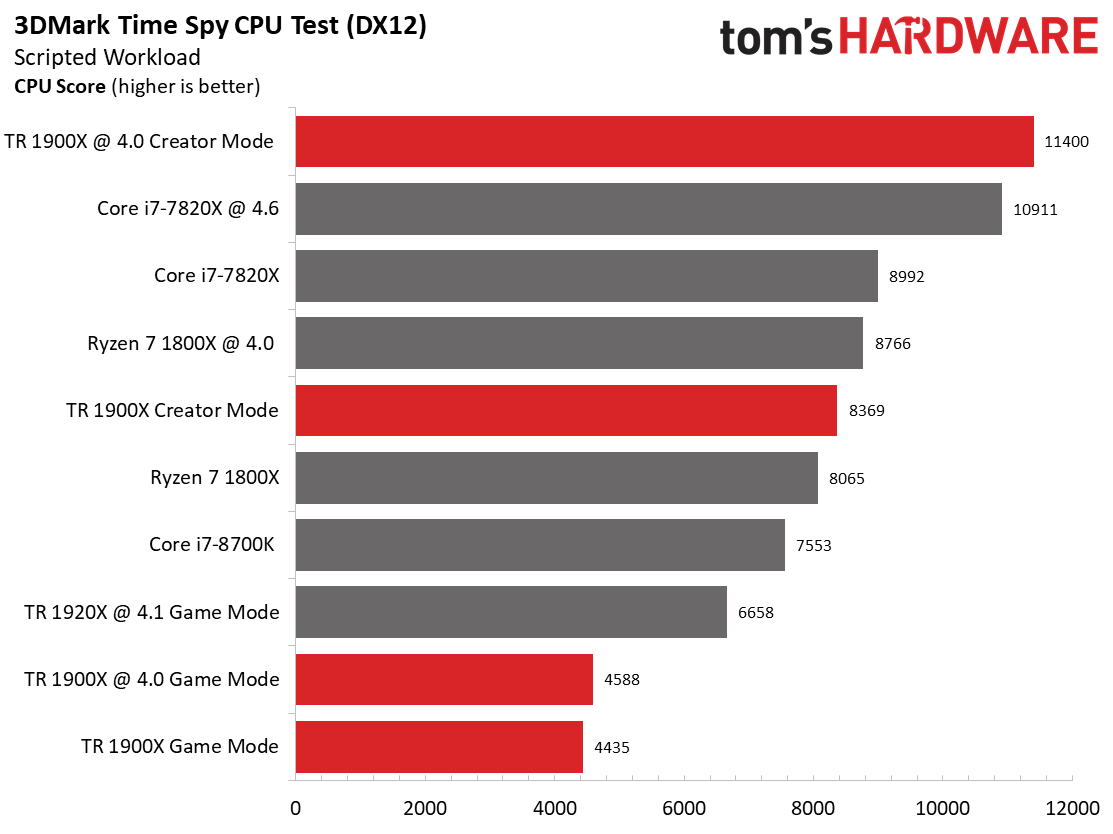
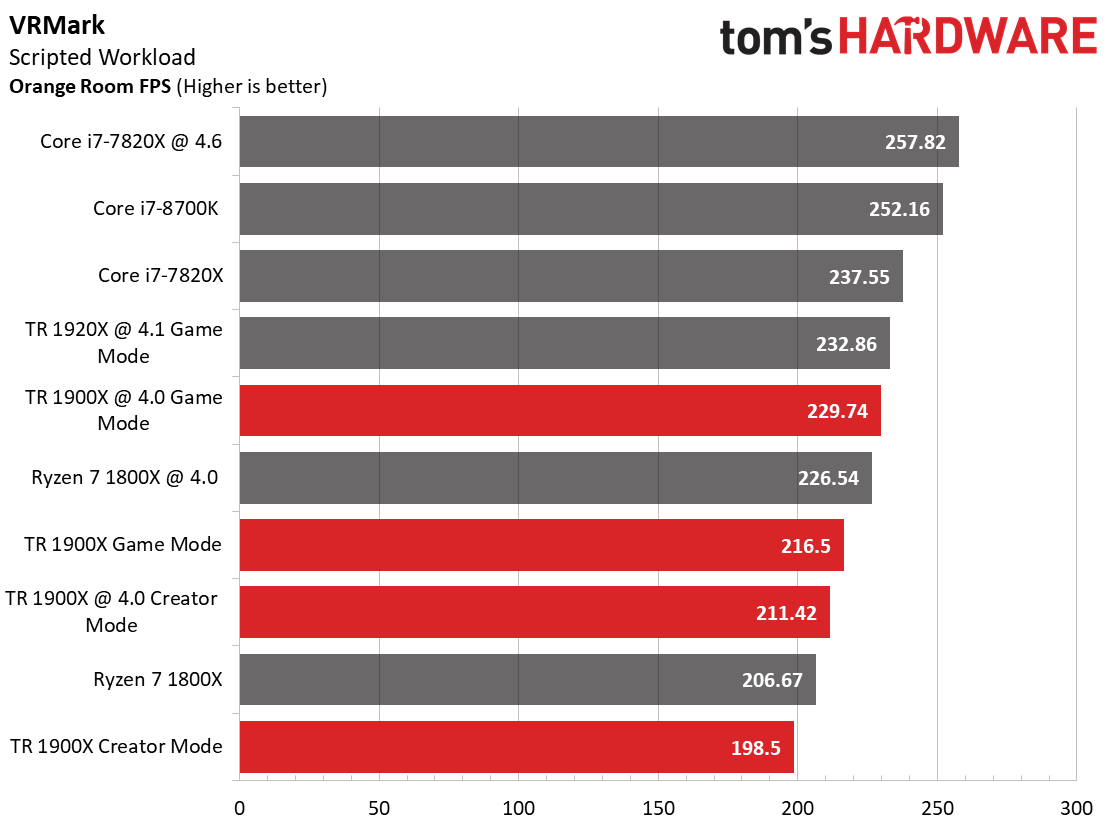
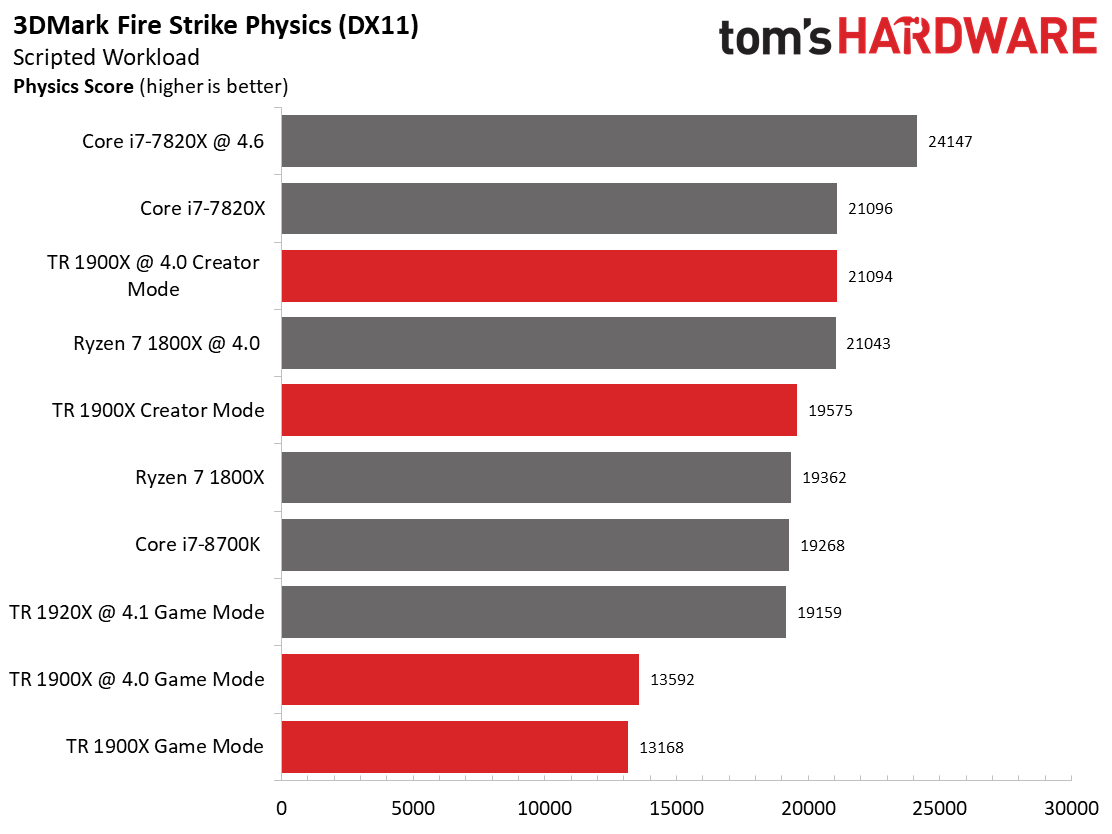
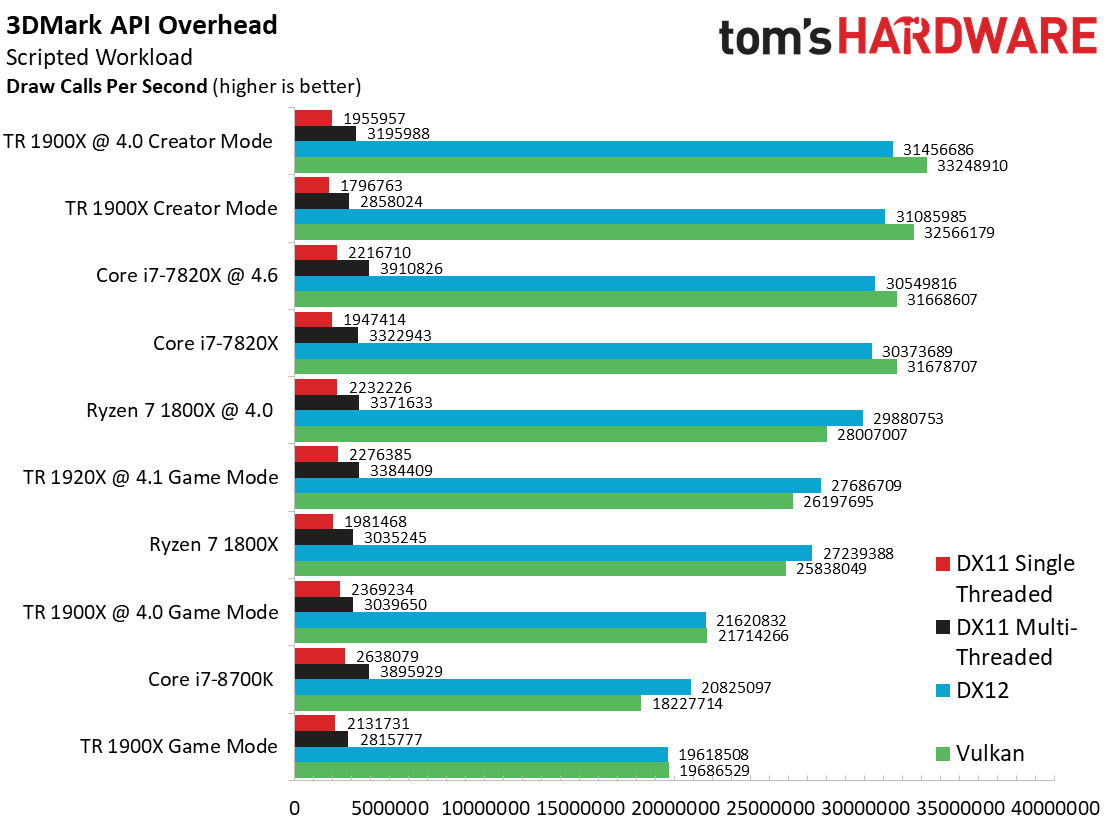
As expected in VRMark, Threadripper 1900X offers its best performance in Game Mode, even beating the tuned Creator Mode configuration. VRMark tends to favor high clock rates, so the Ryzen 7 1800X suffers at stock settings due to its lower frequency. However, it nearly catches the 1900X after tuning.
The 1900X in Creator Mode takes a healthy lead over its competition during the DX12 tests, even beating out Intel's tuned Core i7-7820X. It suffers in Game Mode, though. That isn't surprising; we disable half of the chip's compute resources in a test that scales well with core count, after all.
Ashes of the Singularity: Escalation
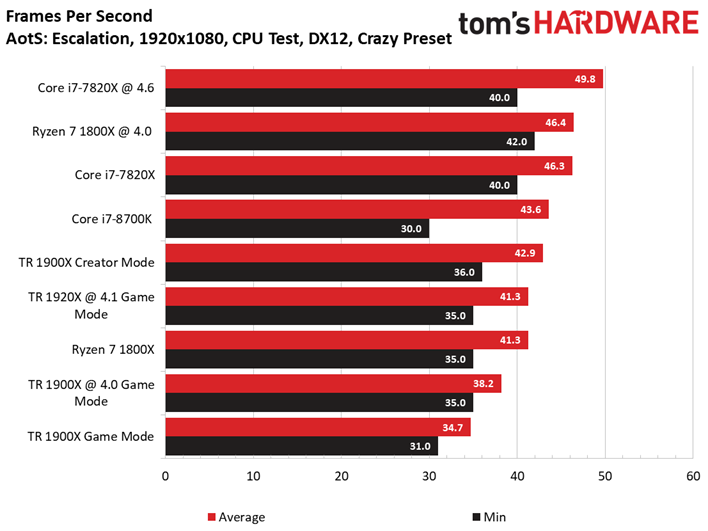
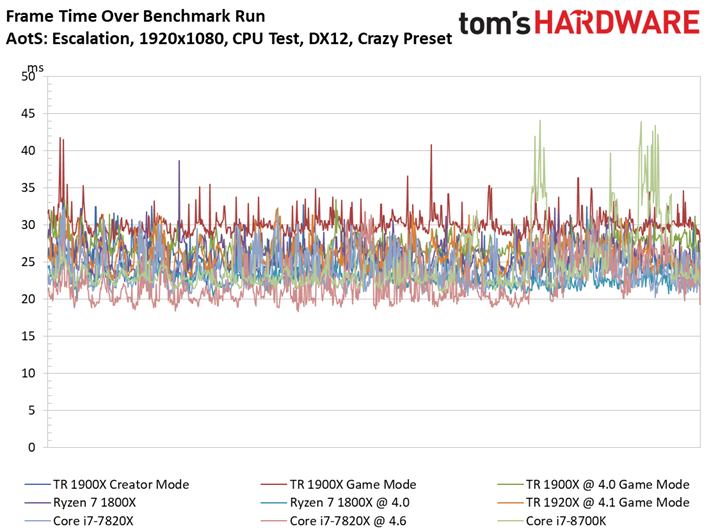
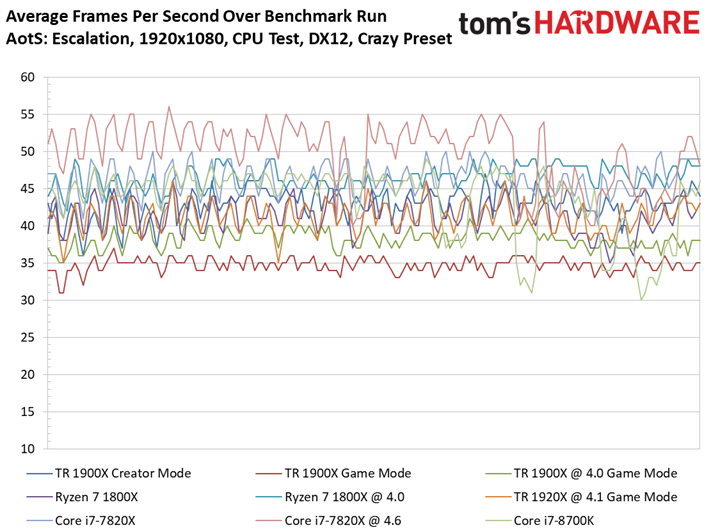
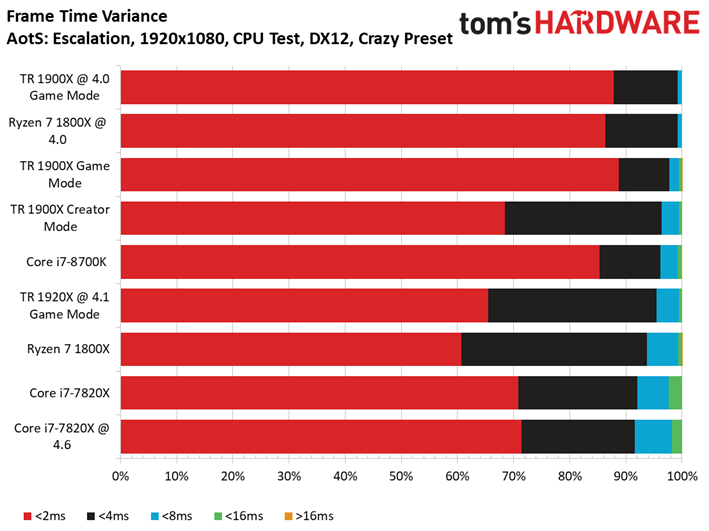
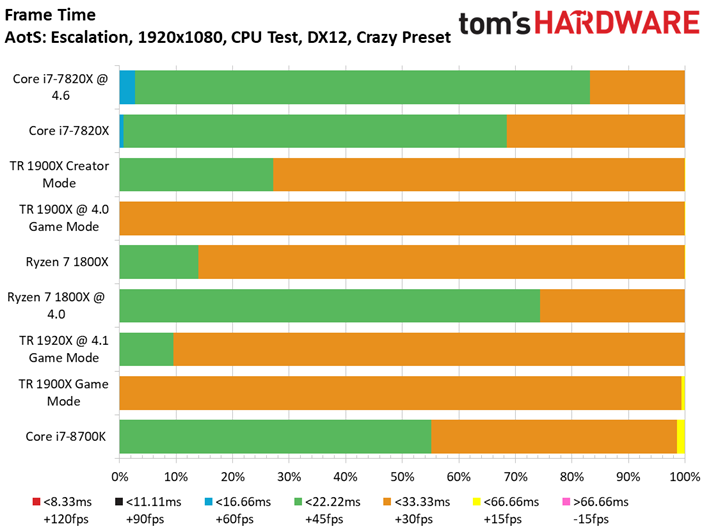
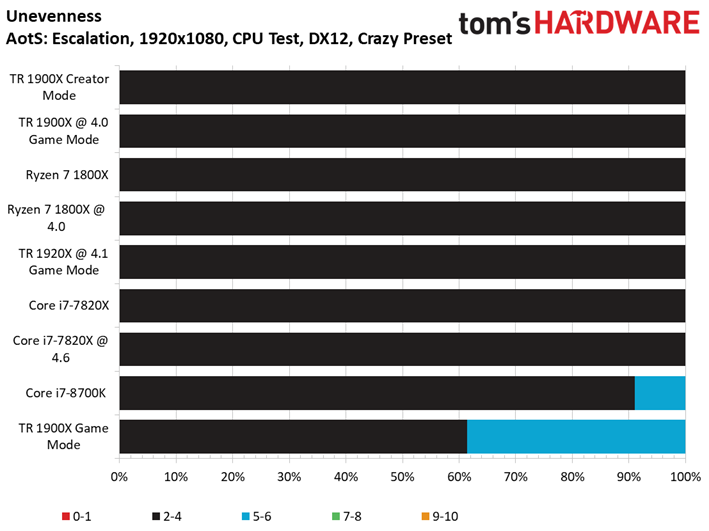
Ashes of the Singularity is the poster child for threaded game engines. And while the Core i7-7820X at 4.6 GHz leads, the Ryzen 7 1800X at 4 GHz challenges Intel's Skylake-X solution. The 1900X trails mightily in Game Mode, but fares better in Creator Mode with eight threads available.
Get Tom's Hardware's best news and in-depth reviews, straight to your inbox.
Even in heavily threaded games, mainstream processors like Ryzen 7 1800X offer the best value.
MORE: Best CPUs
MORE: Intel & AMD Processor Hierarchy
MORE: All CPUs Content
Current page: VRMark, 3DMark & AotS: Escalation
Prev Page Overclocking, Infinity Fabric & Test Setup Next Page Civilization VI, Battlefield 1 & Dawn of War III
Paul Alcorn is the Editor-in-Chief for Tom's Hardware US. He also writes news and reviews on CPUs, storage, and enterprise hardware.
-
rcrossw My 1900x is on an Asus Prime X399-A and running stable at 4190 Ghz. Temp 44 C. Prior to the 403 Bios it ran at 4225 Ghz.Reply
This is to let others know what I was able to do with the 1900x. I use a Ryzen 1700 for gaming. I do Photo work and Ballistics, on the 1900x. For what I use it for it is superb product. One last thing - I run both systems at 4K Res. Better on my older eyes. -
TechyInAZ Excellent review. I've been waiting for this review for a while since it's the strangest threadripper CPU in the family. Specifically i was wondering if they were going to do two cores per CCX, glad they decided to do just all 4 in one CCX for better latency.Reply -
Kawi6rr Is Threadripper a gaming CPU? If not then why do you test in so many games? Doesn't make sense.Reply -
Paul Alcorn Reply20301236 said:Is Threadripper a gaming CPU? If not then why do you test in so many games? Doesn't make sense.
31 tests for applications. Some tested with both native CPU processing and OpenCL acceleration. Also, four synthetics that measure key performance traits.
10 games, four synthetics.
-
antonysg77 For a normal user who also plays games, Ryzen 7 1700 is a powerful processor, which is power efficient and also comes with its own cooling solution. Also, both the processor and motherboard are very reasonably priced.Reply -
mapesdhs Reply20301281 said:31 tests for applications. Some tested with both native CPU processing and OpenCL acceleration. Also, four synthetics that measure key performance traits that are applicable to some apps.
Bit odd basing the conclusion on tests that are not by the initial introduction representative of the target market for the product. Why does everything have to be about gaming?? If the CPU isn't aimed at gamers in the conventional sense then surely it makes more sense to test it based on the kind of task it is aimed at? For example, setup an X399/1900X system with four GPUs for CUDA in AE or somesuch, compare it to the same GPU config on an X299 board, how do they behave? Efficiency, power consumption, render times, stability during an intense render, etc.
At the very least do some tests at 4K while streaming and show how the systems compare under such a scenario, such as GN has done for various CPU comparisons.
Ian.
-
cryoburner Reply20301236 said:Is Threadripper a gaming CPU? If not then why do you test in so many games? Doesn't make sense.
It makes sense in that they can show that to people who might be considering going with it for a gaming system. Some people tend to think that just because some piece of hardware is more expensive that it will be better for gaming, when in reality that hardware may cost more because it adds features that don't even provide much benefit to games. The 1900X enables quad channel memory with a higher maximum memory limit, but games won't benefit from that, and 16GB of dual channel memory should work just as well for years to come. Likewise, a gaming system won't likely see much benefit from having a CPU with 64 PCIe lanes. Someone wanting an 8 core processor for a gaming system would likely get comparable performance by overclocking a Ryzen 1700 on an X370 motherboard for several hundred dollars less. The same goes for other HEDT processors with lots of cores like the other Threadripper parts and Intel's equivalents. For gaming, those extra cores won't likely provide any benefit, and will likely only make it harder to keep the chip cool,resulting in lower clock rates if anything. Of course, there will also be some people who want those extra hardware features for specific tasks other than gaming, but may want to be able to game on the system as well. -
anbello262 Reply20301236 said:Is Threadripper a gaming CPU? If not then why do you test in so many games? Doesn't make sense.
This site is aimed mainly at gamers, so it makes sense to base the conclusion on gaming performance. You just seem to be upset that "someone might read this the wrong way and think AMD sucks", as if our job would be caring for the companies best interests.
They can do their own marketing, the job of Tom's is to give us all the information in the most scientifically accurate way possible, and then sum it up with a conclusion aimed at their readers, who are mostly gamers.
If you are not a gamer, then you can just read the pages with the productivity apps, and just ignore the conclusion (since it will not apply to you). There is no misrepresentation or false information anywhere in the article -
Paul Alcorn Well, the conclusion also takes application performance into account.Reply
"The real competition happens in our application workloads."
Also, there are seven application price efficiency charts in the conclusion. -
Nintendork BILLY GATESReply
Dunno if you forgot than with any TR chip you will get the full 64pcie lanes + ECC support. Where can you find that even on the 2K i9? Well, you won't.
